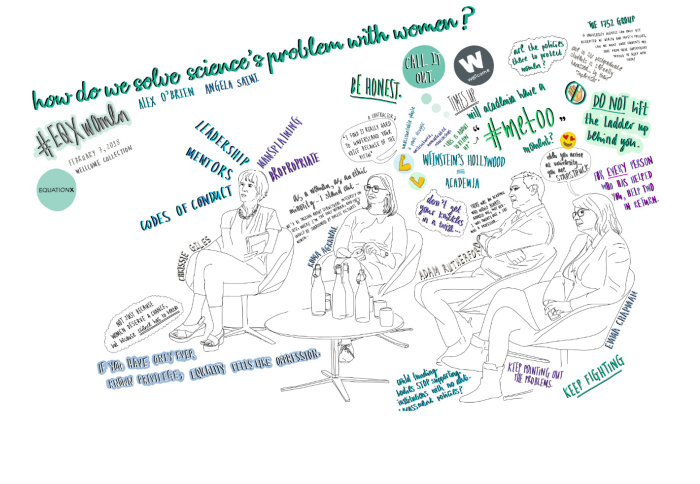How do we Solve Science's Problem with Women?

Equation X debate
It should come as no surprise that women in science continue to face barriers to their success: sexism and harassment, bias in grant allocation/peer review, and professional isolation. On Wednesday 7th February, Imperial Women in Physics (WiP) attended the first Equation X debate at the Wellcome Collection. Over the course of the evening, 150 of us discussed the ways in which we can combat the structural problems facing women in science.
The evening began with a talk from engineer-turned-journalist Angela Saini, whose 2017 book ‘Inferior: How Science Got Women Wrong and the New Research That’s Rewriting the Story’ explores the ways in which gender bias in scientific research has changed the lives and perceptions of women today. We were lucky to host her at Imperial College in November. Saini discussed the importance of having a diversity of opinion within research. An example from her book is particularly shocking: as it is cheaper for researchers to keep male mice, the majority of pharmacology research avoids investigating on the impact of drugs on women. Importantly, she noted that ‘everyone has biases: but if only fifty percent of the population are represented in a study, then only their needs have an impact’. This is as true for what we observe and measure as it is for what we choose to study.
The discussion was led by the Wellcome Trust’s Chrissie Giles, Imperial alum and structural engineer Roma Agrawal, responsible for the top of the Shard; Dr Emma Chapman, Imperial College London Royal Astronomical Society; and Dr Adam Rutherford, a geneticist, teacher and BBC Radio 4 presenter. The discussion ranged from shared parental leave, bias in student feedback, and how to implement policy to tackle supervisor-student sexual harassment. It was suggested that academia is close to a ‘Harvey Weinstein moment’ (with unstructured, power-based relationships between academics and students leading to 1 in 6 postgraduate students reporting sexual harassment at work).
The debate reached a powerful conclusion when speakers were asked for advice on how they personally would affect positive change for women in science. Dr Emma Chapman reminded us ‘not to pull the ladder up behind us’, instead using our platform to raise up young women entering the world of science today. This advice was followed by an equally important reminder by Roma Agrawal to recognise our own privilege, and use it to become allies to those who aren’t as privileged as we are. Importantly, as Dr Rutherford quoted on men who resent opportunities offered to women, “when you have only known privilege, equality feels like oppression”.
The event was an empowering and interesting discussion on the structural issues facing women in science today. Find out more about EquationX at (https://www.facebook.com/EquationXevents/ ), or Imperial College Women in Physics (WiP) at (http://www.imperial.ac.uk/physics/about/women-in-physics/ ).
Article text (excluding photos or graphics) © Imperial College London.
Photos and graphics subject to third party copyright used with permission or © Imperial College London.
Reporter
Jessica Wade
Department of Materials
Caroline Jackson
Department of Physics
Anita Chandran
Outreach